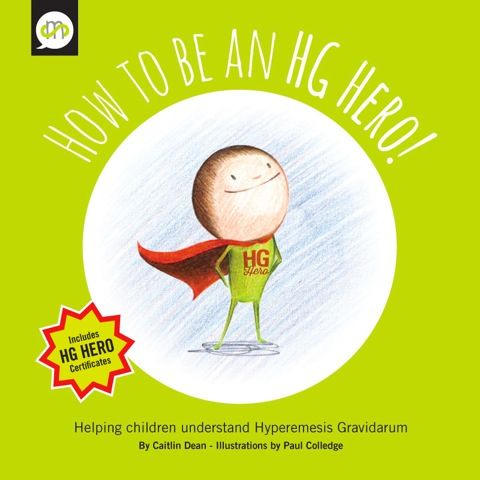Contributing to medical research
I handed the blog over to Dr Margaret O’Hara - HG survivor, medical physicist and Trustee of Pregnancy Sickness Support to talk about our current research and the importance of NVP and HG sufferers and survivors being involved.

One of the aims of PSS is to highlight women’s experiences of HG to healthcare professionals and the wider public. This isn’t just about raising awareness so that women will have some support for the condition, although that is very important. We also want to contribute to medical research so that the questions which researchers seek to answer are sensible and useful. You will never uncover anything useful if the question you are asking in the first place is based on poor assumptions.
We know that this isn’t just an academic issue, these research results feed back into people’s beliefs about HG, and that directly impacts women. An example of this is the lack of agreement over the recurrence rates for HG, in other words if you’ve had HG once, how likely are you to have it again. At PSS, we often hear of a woman going to their GP again after a first HG pregnancy and being told ‘Oh every pregnancy’s different, you probably won’t get it again.’ So, feeling reassured, she embarks on another pregnancy, gets HG (because actually the recurrence rate is very high) but she has done no preparation and is now caught out with another child to look after and not enough support. We also know that women in this situation are more likely to be forced to terminate the pregnancy.
So the stakes are very high indeed, and good quality information is essential. You would think it would be easy to find out how likely HG is to recur again – surely you could simply ask women who have had HG and then have another pregnancy and count how many get it again? This is one approach, but unfortunately, this hasn’t always been the way it’s done. It is also complicated by the fact that we don’t have a good definition of what constitutes HG that everyone agrees on. Historically, HG has been defined, in part, by the treatment – i.e. if you ended up in hospital on a drip for dehydration, then you’ve had HG. If you didn’t, then you haven’t. Again, this is one of these situations which women who’ve had HG will find bewildering.
What if you tried to get IV fluids but you were sent home by a doctor who didn’t think your ketones were high enough? Compare a woman who gets antiemetics as soon as she requests them so manages to drink a little, with a woman who is left with no medication so can’t eat or drink anything at all. Or compare one women whose partner brings food and drink to her bedside, with one who has nobody to help so has to get up to go to the kitchen for a drink which sets off a vomiting bout that she can’t control. The former might avoid a hospital admission, while the latter doesn’t. Does the first one not have HG? According to the strict definition, no she doesn’t.
One of the main studies on recurrence of HG was based purely on hospital records for admissions for fluids. They didn’t even contact any of the women to ask them about their experiences. They found that 15% of the women with a first admission to hospital for HG came back in on a subsequent pregnancy. Based on this, they reported that there is a 15% chance of recurrence. The study was done in Norway, and what we know from women in Norway, is that the model of care for women with HG during the time of the study, was based on the idea that women with HG were making themselves sick and needed to be shocked into pulling themselves together. They were isolated in a dark room, refused visitors for the entire stay, and forced to try and eat. You can imagine that if this was the prospect of a hospital admission, you would be very strongly motivated not to go anywhere near a hospital in your next pregnancy. A Norwegian woman that we know told us that she put in place a lot of family support for her next pregnancy and avoided admission, but she was every bit as ill as she had been in the first pregnancy. As far as she is concerned, she had HG in both pregnancies. As far as the researchers are concerned she only had it once.
Compare this with research done by a group in the USA which involved former sufferers, where they asked women to describe their symptoms and didn’t just rely on hospital records. They found that the recurrence rate was 86%. Other studies find a recurrence rate in between these numbers and none of them agree on what combination of symptoms and treatments constitutes a diagnosis of HG.
This is why it is very important for patients to be involved in research, especially for conditions like HG which are poorly described, and suffered alone out of sight of anyone. We, as a body of patients, have knowledge about our condition which is simply not seen outside of our circles. At PSS, we want to try to bring out that knowledge and have it published in academic literature where healthcare professionals will see it and take notice.

Spewing Mummy and I design surveys to answer specific questions to address some of the knowledge gaps and misconceptions which exist because of poorly done research in the past. We want to get the full picture out there so that ultimately it will feed back into better care. So that in future you will go to your GP to discuss another pregnancy and they will say, yes, the recurrence rate is very high, let’s make a plan for your next pregnancy so that we’re prepared for the worst.
We have a survey open at the moment for women who have had more than one HG pregnancy in the UK lasting at least 30 weeks in the past ten years. We are inviting anyone who is eligible to follow the link below to tell us your experience. All the answers are anonymous and we will write up the results for publication. We hope that you will relish the opportunity to set the record straight and shed light on how things really are for women with HG, and thank you in advance for taking part.
Share with...
Blog archive
2017February 2017 (1)January 2017 (5)2016November 2016 (1)October 2016 (1)September 2016 (4)August 2016 (1)July 2016 (1)June 2016 (3)April 2016 (2)February 2016 (2)January 2016 (1)2015December 2015 (2)November 2015 (1)October 2015 (1)September 2015 (1)August 2015 (1)July 2015 (3)June 2015 (5)May 2015 (3)April 2015 (3)March 2015 (3)February 2015 (5)January 2015 (3)2014December 2014 (1)November 2014 (4)October 2014 (4)September 2014 (3)August 2014 (4)July 2014 (3)June 2014 (2)May 2014 (5)April 2014 (5)March 2014 (5)February 2014 (4)January 2014 (5)2013December 2013 (6)November 2013 (6)October 2013 (10)September 2013 (5)July 2013 (1)June 2013 (1)April 2013 (1)March 2013 (2)February 2013 (1)2012December 2012 (1)June 2012 (1)February 2012 (1)2011December 2011 (1)November 2011 (1)October 2011 (1)September 2011 (1)July 2011 (2)June 2011 (1)May 2011 (6)April 2011 (1)The Book

The Kids Book

About Me
 I am mother of three beautiful children and wife to a fantastic and supportive husband. I am a nurse, a farmer and a trustee for Pregnancy Sickness Support. I love working hard and spending time with my kids.
I am mother of three beautiful children and wife to a fantastic and supportive husband. I am a nurse, a farmer and a trustee for Pregnancy Sickness Support. I love working hard and spending time with my kids.
About this blog
Information and support for pregnancy sickness and hyperemesis gravidarum. Views are my own and do not represent those of any other organisation. Information provided here should not be a substitute for medical advice. My aim is to raise awareness and encourage sufferers to know they are not alone.
Previous award nominations



Archive
Explore past posts:
2017February 2017 (1)January 2017 (5)2016November 2016 (1)October 2016 (1)September 2016 (4)August 2016 (1)July 2016 (1)June 2016 (3)April 2016 (2)February 2016 (2)January 2016 (1)2015December 2015 (2)November 2015 (1)October 2015 (1)September 2015 (1)August 2015 (1)July 2015 (3)June 2015 (5)May 2015 (3)April 2015 (3)March 2015 (3)February 2015 (5)January 2015 (3)2014December 2014 (1)November 2014 (4)October 2014 (4)September 2014 (3)August 2014 (4)July 2014 (3)June 2014 (2)May 2014 (5)April 2014 (5)March 2014 (5)February 2014 (4)January 2014 (5)2013December 2013 (6)November 2013 (6)October 2013 (10)September 2013 (5)July 2013 (1)June 2013 (1)April 2013 (1)March 2013 (2)February 2013 (1)2012December 2012 (1)June 2012 (1)February 2012 (1)2011December 2011 (1)November 2011 (1)October 2011 (1)September 2011 (1)July 2011 (2)June 2011 (1)May 2011 (6)April 2011 (1)Online recommendations
- Best Non Gamstop Casinos 2025
- UK Casinos Not On Gamstop
- Casinos Not On Gamstop
- UK Casinos Not On Gamstop
- Non Gamstop Casino
- Best Betting Apps
- Best Non Gamstop Casinos
- Gambling Sites Not On Gamstop
- Non Gamstop Casino Sites UK
- Slot Sites Not On Gamstop
- Casino Not On Gamstop
- Best Non Gamstop Casinos
- Best Casino Sites Not On Gamstop 2025
- Non Gamstop Casinos
- Casino Sites UK Not On Gamstop
- Non Gamstop Casino UK
- Non Gamstop Casino UK
- Non Gamstop Casinos
- Slots Not On Gamstop
- Slots Not On Gamstop
- UK Casino Sites Not On Gamstop
- UK Casinos Not On Gamstop


Comments